
d'ALESSANDRO Eugénie
Following my medical studies, I worked in Africa, South-East Asia and Caucasus with Médecins Sans Frontières. These missions enabled me to built a strong work experience regarding large-scale public health programmes. As a field and medical coordinator, I had to plan and supervise different kind of projects in the context of primary health care as well as vertical programmes (TB and HIV/aids). During these experiences, I also learn to work in specific contexts: outbreaks, food insecurity, armed conflict areas.
Understanding and analysis of health issues need a multidisciplinary approach. Thus, I decided to complete my field experiences with academic studies in social sciences and I was PhD graduated in 2014 in the Ecole des Hautes Etudes en Sciences Sociales.
Nowadays, my research concerns the multiples dimensions of health programme development and implementation from health policy to populations’ practices and perceptions. Published in peer-reviewed scientific journals, my studies bring out features for deep understanding in a range of public health issues: Ebola outbreaks response activities, Community engagement in clinical trial in Uganda, TB policy in Thailand and in Georgia, populations’ behaviours toward immunization in France, hospital risk of infection and health care workers’ practices in West Africa, prevention of HIV/aids in Togo, meningococcal outbreaks and trypanosomiasis disease in Africa, etc.
Besides research, I am a part-time lecturer at Aix-Marseille University and in nursing schools. Through this activity, I try to share my experience and knowledge and to follow my students along their research work.
Phone: 0647265322
Understanding and analysis of health issues need a multidisciplinary approach. Thus, I decided to complete my field experiences with academic studies in social sciences and I was PhD graduated in 2014 in the Ecole des Hautes Etudes en Sciences Sociales.
Nowadays, my research concerns the multiples dimensions of health programme development and implementation from health policy to populations’ practices and perceptions. Published in peer-reviewed scientific journals, my studies bring out features for deep understanding in a range of public health issues: Ebola outbreaks response activities, Community engagement in clinical trial in Uganda, TB policy in Thailand and in Georgia, populations’ behaviours toward immunization in France, hospital risk of infection and health care workers’ practices in West Africa, prevention of HIV/aids in Togo, meningococcal outbreaks and trypanosomiasis disease in Africa, etc.
Besides research, I am a part-time lecturer at Aix-Marseille University and in nursing schools. Through this activity, I try to share my experience and knowledge and to follow my students along their research work.
Phone: 0647265322
less
Related Authors
Annie Daubenton
Bibliothèque nationale de France
silvia serrano
Sorbonne University
Roland Elsa
Université libre de Bruxelles
Martin Vander Elst
UCLouvain (University of Louvain)
Anne Yvonne GUILLOU
Centre National de la Recherche Scientifique / French National Centre for Scientific Research
Oumy Thiongane
CIRAD
BEN GHOZZIA Jalel
Université de Strasbourg
InterestsView All (8)







Uploads
Papers by d'ALESSANDRO Eugénie
Méthodes : Inscrite dans une démarche qualitative, cette étude a été réalisée à Ouagadougou auprès de médecins généralistes et spécialistes. Les techniques mobilisées sont l’entretien individuel semi-directif et l’observation directe. Au total, 47 entretiens ont été réalisés au niveau de Centres médicaux avec antenne chirurgicale (CMA) et de centres hospitaliers universitaires (CHU).
Résultats : Nos résultats montrent que les phytomédicaments n’ont pas été inclus dans la formation initiale des médecins enquêtés. Les seules sources d’information pour les médecins sont alors les collègues, la famille, les patients ou encore les médias. Leurs perceptions de ce type de médicaments sont ambivalentes allant du « produit naturel » au produit exposant à un risque du fait du manque d’études. Les pratiques de prescription s’inscrivent principalement dans quatre logiques : expériences personnelles et professionnelles, jugement des patients, validation par des essais cliniques et prise en compte du risque iatrogène.
Discussion : En l’absence de cadre académique fort, la connaissance des phytomédicaments s’est acquise par voie informelle. Les normes et références techniques restant faibles, plusieurs logiques subjectives s’imposent dans la construction des pratiques de prescription.
Conclusion : Au-delà des dimensions symboliques et subjectives expliquant la faible prescription des phytomédicaments, notre étude invite à s’interroger sur la responsabilité politique et institutionnelle dans la faible intégration de la médecine traditionnelle dans le système de soins burkinabé.
Methodology/Principal Findings: We conducted a qualitative study based on semi-structured interviews in 3 cystic fibrosis referral centres in Paris, France. The study included 42 patients with cystic fibrosis: 24 who refused the vaccine and 18 who were vaccinated. The two groups differed quite substantially in their perceptions of vaccine- and disease-related risks. Those who refused the vaccine were motivated mainly by the fears it aroused and did not explicitly consider the 2009 A/H1N1 flu a potentially severe disease. People who were vaccinated explained their choice, first and foremost, as intended to prevent the flu’s potential consequences on respiratory cystic fibrosis disease. Moreover, they considered vaccination to be an indirect collective prevention tool. Patients who refused the vaccine mentioned multiple, contradictory information sources and did not appear to consider the recommendation of their local health care provider as predominant. On the contrary, those who were vaccinated stated that they had based their decision solely on the clear and unequivocal advice of their health care provider.
Conclusions/Significance: These results of our survey led us to formulate three main recommendations for improving adhesion to new pandemic vaccines. (1) it appears necessary to reinforce patient education about the disease and its specific risks, but also general population information about community immunity. (2) it is essential to disseminate a clear and effective message about the safety of novel vaccines. (3) this message should be conveyed by local health care providers, who should be involved in implementing immunization.
Books by d'ALESSANDRO Eugénie
The authors of this book describe and analyze the emergence of new medical practices in humanitarian situations: in other words, how can we create a momentum for change benefiting affected populations? Taking advantage of lessons learned can help us better understand how to operate in specific settings, with the goal of replacing the non-therapeutic practices that doctors and political decision-makers too often tolerate, citing the poverty and ignorance of affected populations or under the pretext of complying with international recommendations, economic constraints, and public authorities.
This book is a group effort rather than a collection of articles written by experts working independently. The authors are seven doctors, a pharmacist, and three sociologists. They based their work on a review of MSF archives and publications, along with interviews with former and current managers who were or are involved in the process of bringing medical innovation to humanitarian settings.
Méthodes : Inscrite dans une démarche qualitative, cette étude a été réalisée à Ouagadougou auprès de médecins généralistes et spécialistes. Les techniques mobilisées sont l’entretien individuel semi-directif et l’observation directe. Au total, 47 entretiens ont été réalisés au niveau de Centres médicaux avec antenne chirurgicale (CMA) et de centres hospitaliers universitaires (CHU).
Résultats : Nos résultats montrent que les phytomédicaments n’ont pas été inclus dans la formation initiale des médecins enquêtés. Les seules sources d’information pour les médecins sont alors les collègues, la famille, les patients ou encore les médias. Leurs perceptions de ce type de médicaments sont ambivalentes allant du « produit naturel » au produit exposant à un risque du fait du manque d’études. Les pratiques de prescription s’inscrivent principalement dans quatre logiques : expériences personnelles et professionnelles, jugement des patients, validation par des essais cliniques et prise en compte du risque iatrogène.
Discussion : En l’absence de cadre académique fort, la connaissance des phytomédicaments s’est acquise par voie informelle. Les normes et références techniques restant faibles, plusieurs logiques subjectives s’imposent dans la construction des pratiques de prescription.
Conclusion : Au-delà des dimensions symboliques et subjectives expliquant la faible prescription des phytomédicaments, notre étude invite à s’interroger sur la responsabilité politique et institutionnelle dans la faible intégration de la médecine traditionnelle dans le système de soins burkinabé.
Methodology/Principal Findings: We conducted a qualitative study based on semi-structured interviews in 3 cystic fibrosis referral centres in Paris, France. The study included 42 patients with cystic fibrosis: 24 who refused the vaccine and 18 who were vaccinated. The two groups differed quite substantially in their perceptions of vaccine- and disease-related risks. Those who refused the vaccine were motivated mainly by the fears it aroused and did not explicitly consider the 2009 A/H1N1 flu a potentially severe disease. People who were vaccinated explained their choice, first and foremost, as intended to prevent the flu’s potential consequences on respiratory cystic fibrosis disease. Moreover, they considered vaccination to be an indirect collective prevention tool. Patients who refused the vaccine mentioned multiple, contradictory information sources and did not appear to consider the recommendation of their local health care provider as predominant. On the contrary, those who were vaccinated stated that they had based their decision solely on the clear and unequivocal advice of their health care provider.
Conclusions/Significance: These results of our survey led us to formulate three main recommendations for improving adhesion to new pandemic vaccines. (1) it appears necessary to reinforce patient education about the disease and its specific risks, but also general population information about community immunity. (2) it is essential to disseminate a clear and effective message about the safety of novel vaccines. (3) this message should be conveyed by local health care providers, who should be involved in implementing immunization.
The authors of this book describe and analyze the emergence of new medical practices in humanitarian situations: in other words, how can we create a momentum for change benefiting affected populations? Taking advantage of lessons learned can help us better understand how to operate in specific settings, with the goal of replacing the non-therapeutic practices that doctors and political decision-makers too often tolerate, citing the poverty and ignorance of affected populations or under the pretext of complying with international recommendations, economic constraints, and public authorities.
This book is a group effort rather than a collection of articles written by experts working independently. The authors are seven doctors, a pharmacist, and three sociologists. They based their work on a review of MSF archives and publications, along with interviews with former and current managers who were or are involved in the process of bringing medical innovation to humanitarian settings.